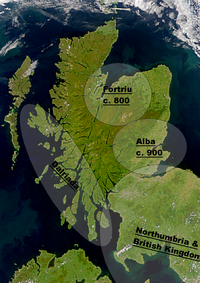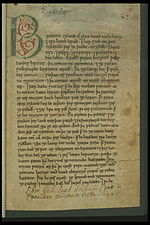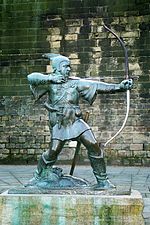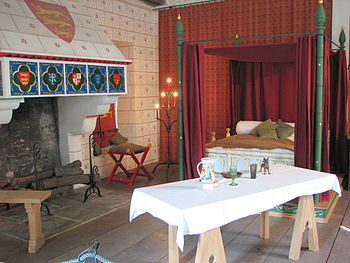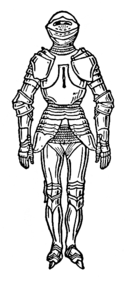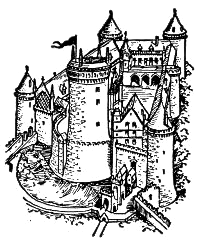
Portal:Medieval Britain
- Wikipedia portals: Culture
- Geography
- Health
- History
- Mathematics
- Natural sciences
- People
- Philosophy
- Religion
- Society
- Technology
| Edit |
Great Britain during the Middle Ages (from the 5th century withdrawal of Roman forces from the province of Britannia and the Germanic invasions, until the Early modern period) was fragmented into a number of independent kingdoms. By the High Middle Ages, after the end of the Viking Age and the Norman Conquest, the kingdoms of England and Scotland emerge as the main poles of political power.
The medieval period in England can be dated from the arrival in Kent of Anglo-Saxon troops led by the legendary Hengest and Horsa. Subsequently the Brythonic, Celtic powers were conquered by Jutes, Angles and Saxons Germanic tribes, from the contemporary Angeln and Jutland areas of northern Germany and mainland Denmark. Political takeover of other areas of England proceeded piecemeal and was not completed until the tenth century. Similarly, the end of the medieval period is usually dated by the rise of what is often referred to as the " English Renaissance" in the reign of Henry VIII of England, and the Reformation in Scotland, or else to the establishment of a centralized, bureaucratic monarchy by Henry VII of England. From a political point of view, the Norman Conquest of England divides medieval Britain in two distinct phases of cultural and political history. From a linguistic point of view the Norman Conquest had only a limited effect, Old English evolving into Middle English, although the Anglo Norman language would remain the language of those that ruled for two centuries at least, before mingling with Middle English.
At the height of pre-Norman medieval English power, a single English king ruled from the border with Scotland to the border with Wales to the border with Cornwall. After the Norman Conquest, English power intruded into Wales with increasing vigour, but the process of consolidation was continuous and is not just a medieval feature. The other problem with suggesting such a unity is that the various states had relations with Scandinavia and Continental Europe which are excluded by the concept. For example, northern Scotland often had closer ties with Norway and France (see Auld Alliance) than England or Wales in the medieval period, with Orkney and Shetland only becoming part of Scotland in 1471. Southern England, due to its proximity to Normandy, Flanders and Brittany, had closer relations with them than the other regions. (read more . . . )
Selected article
The Anglo-Saxon Chronicle is a collection of annals in Old English narrating the history of the Anglo-Saxons. The annals were created late in the 9th century, probably in Wessex, during the reign of Alfred the Great. Multiple manuscript copies were made and distributed to monasteries across England and were independently updated. In one case, the chronicle was still being actively updated in 1154.
Nine manuscripts survive in whole or in part, though not all are of equal historical value, and none of them is the original version. The oldest seems to have been started towards the end of Alfred's reign, while the most recent was written at Peterborough Abbey after a fire at the monastery there in 1116. Almost all of the material in the chronicle is in the form of annals, by year; the earliest are dated at 60 BC, and historical material follows up to the year in which the chronicle was written, at which point contemporary records begin. These manuscripts collectively are known as the Anglo-Saxon Chronicle. The Chronicle is not unbiased: there are occasions when comparison with other medieval sources makes it clear that the scribes who wrote it omitted events or told one-sided versions of stories; there are also places where the different versions contradict each other. However, taken as a whole, the Chronicle is the single most important historical source for the period between the departure of the Romans and the Norman Conquest. Much of the information given in the Chronicle is not recorded elsewhere. In addition, the manuscripts are important sources for the history of the English language; in particular, the later Peterborough text is one of the earliest examples of Middle English in existence.
Seven of the nine surviving manuscripts and fragments now reside in the British Library. The remaining two are in the Bodleian Library and the library of Corpus Christi College, Cambridge. (Read more...)
Selected biography
Robin Hood is an archetypal figure in English folklore, whose story originates from medieval times but who remains significant in popular culture where he is painted as a man known for robbing the rich to give to the poor and fighting against injustice and tyranny. His band consists of a "seven score" group of fellow outlawed yeomen – called his " Merry Men". He has been the subject of numerous movies, television series, books, comics, and plays. In the earliest sources portrayed as a commoner he would often later be portrayed as the dispossessed Earl of Huntingdon. There is no consensus as to whether or not Robin Hood is based on any historical figure and little reliable historical evidence to support either side of this debate.
In popular culture Robin Hood and his band are usually seen as living in Sherwood Forest in Nottinghamshire. Much of the action of the early ballads does take place in Nottinghamshire, and the very earliest known ballad does show the outlaws operating in Sherwood Forest. So does the very first recorded Robin Hood rhyme, four lines from the beginning of the 15th century beginning "Robyn hode in scherewode stod" However, the overall picture from the surviving early ballads and other early references shows Robin Hood based in the Barnsdale area of what is now South Yorkshire (which borders Nottinghamshire), and other traditions also point to Yorkshire. A tradition dating back at least to the end of the 16th century gives his birthplace as Loxley in South Yorkshire, while the site of Robin Hood's Well in Yorkshire has been associated with Robin Hood at least since 1422. His grave has been claimed to be at Kirklees Priory in West Yorkshire, as implied by the 18th century version of Robin Hood's Death, and there is a headstone there of dubious authenticity.
s
| “ | I attacked the English of the Northern Shires like a lion. I ordered their houses and corn, with all their belongings, to be burnt without exception and large herds of cattle and beasts of burden to be destroyed wherever they were found. It was there I took revenge on masses of people by subjecting them to a cruel famine; and by doing so — alas!— I became the murderer of many thousands of that fine race. | ” |
|
—William the Conqueror, Ordericus Vitalis |
||
Selected picture
Reconstitution of Edward I of England's apartments at the Tower of London (read more . . . )
Did you know?
- ... that the Unlearned Parliament was so called because lawyers were forbidden to attend as Henry IV (pictured) felt they were "troublesome"??
- ... that the epic poems Beowulf and Judith were written in Late West Saxon?
- ... that the ember days were formerly set aside for fasting and prayer in the liturgical year of the Western churches?
- ... that silver coins in the 10th-century Viking Harrogate Hoard, recovered intact in Yorkshire, January 2007, came from as far as Afghanistan?
|
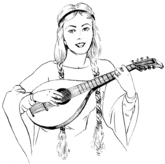 |
||||
Selected panorama
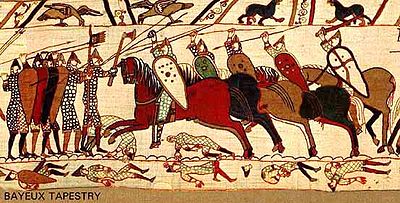
The Battle of Hastings as depicted on the Bayeux Tapestry. (read more . . . )
Topics
Early Middle Ages (7th to 11th centuries): England in the Early Middle Ages • Scotland in the Early Middle Ages, Wales in the Early Middle Ages • Anglo-Saxon England • Viking Age
High Middle Ages (11th to 15th centuries): England in the High Middle Ages • Scotland in the High Middle Ages • Wales in the High Middle Ages • Norman England (1066-1154) • House of Plantagenet • House of Dunkeld (1058–1286) • House of Balliol (1292–1338) • History of the Jews in Medieval England
Late Middle Ages (14th and 15th centuries): England in the Late Middle Ages • Scotland in the Late Middle Ages • Wales in the Late Middle Ages • House of Lancaster ( 1399– 1471) • House of York ( 1461– 1485) • House of Bruce (1306–1371) • Transition to Early Modern Britain
Arts: English historians in the Middle Ages • Medieval Welsh literature • Anglo-Saxon literature • Anglo-Norman literature • Middle English • Medieval Scottish literature • Anglo-Saxon art • Viking Art
Conflict: Norman Conquest • Hundred Year War • Wars of Scottish Independence
Related portals
WikiProjects
|
Middle Ages |
Medieval Scotland |
 Norse history and culture |
King Arthur |
|
Wales |
Scotland |
 Isle of Man |
Ireland |
|
England |
 Celts |
Things to do
 |
Here are some tasks you can do:
|
Categories
| |
Middle Ages on Commons Images |
|
Medieval works on Wikisource Texts |
|
History on Wikibooks Manuals & Texts |
- What are portals?
- List of portals
- Featured portals
